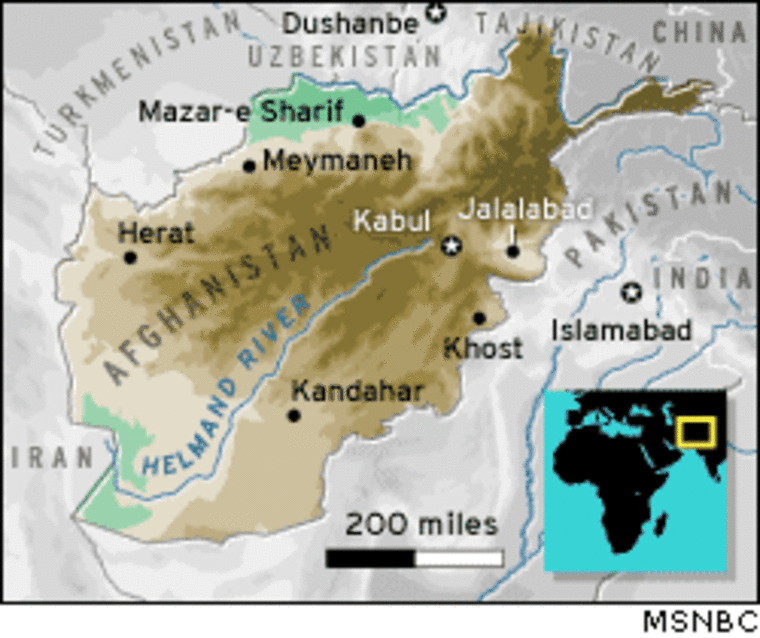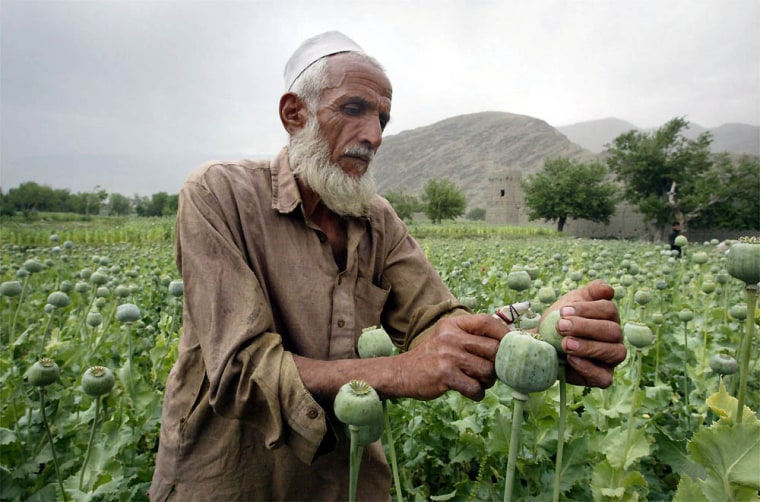In a small village not far from Jalalabad, officer Mohamed Hanif leads his counter-narcotics unit on a drug bust. But it’s not what you might think. They don't go in breaking down doors and rounding up a huge number of suspects.
Here, in one of the world's poorest nations, ravaged by decades of war and struggling to rebuild, the police gather up a few farmers, tear a few branches from a nearby tree and start whacking their way through a field of poppies.
"We’re extremely poor," said Hanif when told his operation looked pretty hapless. "We fight with what we have."
While that may sound pretty pathetic, it has significant implications for the Afghan government and for its biggest ally, the United States. The poppies produce opium, which is turned into heroin. And Afghanistan produces 75 percent of the world's supply.
Nowadays, it's harvest season across Afghanistan's dry rugged farm lands, the perfect terrain for another bumper crop of opium.
Along the countryside and the golf ball-size green bulbs stand a top sturdy long green stems just about everywhere. Farmers scrape the side of the bulbs and collect the pulp that oozes out. After it is dried, the raw material is sold to middlemen who usually come by late at night.
Undermining progress?
Afghanistan’s president Hamid Karzai — who joins Group of Eight leaders this week in Sea Island, Ga., at the invitation of President Bush — has called for a holy war against drugs. Opium, he said, threatens the very existence of the nation.
”Poppy production goes against nation building. It goes against the building of institutions in Afghanistan," Karzai said. "We must rid this country of poppies and return this country to legitimate forms of agriculture."
The president's comments followed a donor conference earlier this year where some $8 billion was pledged to Afghanistan from the international community. Afghanistan is still trying to convince the world it's a good investment.
For Karzai, opium production undermines that message. It's a multi-billion dollar industry far beyond the control of the central government.

The industry is not taxed or regulated and is financing the private fiefdoms of the "warlords” or local military commanders who run huge swaths of territory.
“Every village you go into has a different commander, many of them with a tremendous amount of power. The only way they're able to fund their militias is through opium money,” said Adam Bouloukos of the U.N.'s Drugs and Crime Office.
The drug money not only goes to the warlords. According to officials, it also fuels the war facing 13,500 U.S. troops who are hunting for Osama Bin Laden and his followers in the mountainous border region with Pakistan.
"I don't have any doubt in my mind that the terrorists al-Qaida and the Taliban are directly funded by the drugs money," said Mirwais Yasini, head of the Afghan Counter Narcotics Department.
In an interview this week with the Washington Post, Karzai expressed frustration at the level of corruption in Afghanistan. "I know there is serious corruption, but somehow I cannot grab it; it is a mirage," he said.
Opium still most lucrative option for farmers
The opium problem is getting worse. The most recent survey by the United Nations showed that opium production is soaring across the country, growing in 28 of the nation’s 32 provinces, and approaching record levels.
And what's even more worrying, according to the U.N. report, is that most farmers say they plan to increase the size of their fields, because opium is the only crop that generates cash.
Sayed Halem is a young educated farmer who attends school to learn about medical technology when he's not tending the poppy fields on his family's farm.
He understands supply and demand and the market. He displayed a small package of opium wrapped in leaves about the size of a big hamburger. It's worth about $50, he said. A lot of money for a product that is easily concealable and easily sold.
"If the government pays us, and gives us better seeds for other crops, we won't grow opium," he said.
Halem said he does well by selling opium. But, most of the money never trickles down from the traffickers to the dirt poor Afghan farmer.
Yet, opium is perfect from this hostile environment because it’s easy to harvest and store.
It's not perishable and therefore it's easy to transport to distant lucrative markets. Every farmer says it just makes a lot more sense to grow poppies and opium instead of another product such as wheat.
The Afghan government has neither the means nor the will to pay farmers to not grow poppies.
New offensive in war on drugs
But now, armed with some $45 million from the U.S. government, the Afghan government is planning a stronger offensive when the harvest season moves to other parts of the country later in the year.
The money will help train and equip a 500-man poppy eradication team that will round up and press local recruits into service.
The United Nations also recently helped Afghanistan's government put together a 10-year national drug control strategy.
“No one in the government thinks this is something you can fix very quickly," said the U.N.'s Bouloukos. "You can't fix this problem quickly in any country."
"The whole international community has to come together and fight the menace of drugs like their fight against terrorism,” Yasini said.
Meanwhile what passes for a drug war continues.
The government has a modest goal of destroying 30 percent of the poppy crop this year. Even if officer Hanif and his men manage somehow to contribute to reaching that seemingly lofty goal, that still will leave extraordinary profits for the traffickers and terrorists.
